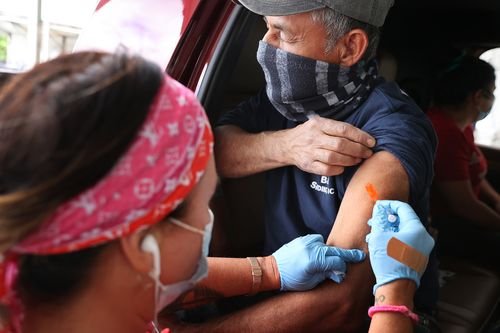Experts predict 185 million people vaccinated in the US by September but worry about variant in India

The United States will likely reach its Covid-19 vaccination goals for the summer, but vaccine hesitancy and variants could still cause a surge in the winter, an influential model predicted Thursday.
With more variants being identified around the world, like the B.1.617 that has sent cases skyrocketing in India, officials are racing to encourage Americans to get vaccinated and help the country reach herd immunity before vaccine-resistant variants develop and reach the US.
Under certain circumstances, virus transmission can “rapidly and explosively” rise, the Institute for Health Metrics and Evaluation at the University of Washington (IHME) said.
Friday morning, Pfizer/BioNTech announced it has begun seeking full approval from the US Food and Drug Administration of its vaccine for people 16 and older. This is the first Covid-19 vaccine in the US to be assessed for full approval from the FDA.
Pfizer’s mRNA two-shot vaccine is currently used under emergency use authorization from the FDA, and full approval may help get people who are holding back vaccinated.
Full approval “takes away one of those drivers of hesitancy in so many Americans” to get vaccinated, CNN medical analyst Megan Ranney said.
“We as scientists have been trying to reassure folks that these vaccines are safe, as well as effective, but once something gets full FDA approval, there’s no more argument,” Ranney said.
“It also allows businesses and universities and schools to start to insist on vaccination with a little more confidence,” she said.
President Joe Biden announced a goal Tuesday of having 70% of the nation’s adult population receive at least one dose of a Covid-19 vaccine by July 4.
The IHME forecast that goal will be reached by the end of May. And by September, 185 million Americans — equivalent to about 88% of the adult population — will be vaccinated, the modelers say.
From there, demand will likely wane as the US comes up against the wall of people hesitant to get the vaccine, the researchers said.
Officials and health experts have set their sights on combating that vaccine hesitancy and reaching the 70% to 85% of the total population that needs to be immune to the virus — through vaccination or previous infection — to control its spread.
Nearly 111 million people, or 33.4% of the US population, are fully vaccinated, according to data published Friday by the US Centers for Disease Control and Prevention, and about 45% of the population, or more than 150 million people, has received at least one dose of a Covid-19 vaccine.
Overall, 254,779,333 doses of Covid-19 vaccine have been administered, according to the CDC data, about 78% of the 327,124,625 total doses delivered.
Incentives and requirements could help, survey finds
Cash, workplace clinics, and mandatory shots before travel or large events could encourage more people to get vaccines, the Kaiser Family Foundation said Thursday.
Three in 10 adults who don’t want to get vaccinated immediately said that they would be more likely to get vaccinated if it was offered somewhere they normally go for health care or if they only needed one dose, according to the poll. It was conducted April 15-29 and made up of 2,097 US adults.
And as the US prepares for the expected emergency use authorization of Pfizer/BioNTech’s Covid-19 vaccine for use in 12-to-15-year-olds next week, the Kaiser Family Foundation also found that 19% of parents said they definitely won’t get their children vaccinated.
KFF notes that “parents’ intentions for vaccinating their children against Covid-19 largely line up with their own vaccination experiences and intentions.”
Reopening and relaxing measures
With vaccine demand and reported cases decreasing, many officials are scaling back efforts to prevent the virus’ spread.
The Missouri National Guard has begun reducing its involvement at mass vaccination sites, Gov. Mike Parson announced Thursday.
“In the beginning, vaccine demand far outweighed vaccine supply. Now, we are seeing the reverse of that, and the need for large scale vaccination events has lessened,” Parson said.
Minnesota Gov. Tim Walz announced a timeline to end Covid-19 restrictions, including the state mask mandate.
“So our path forward is pretty clear. Minnesota now, the next three weeks really, it’s on you to get the vaccines,” Walz said. “It’s on you to talk to your neighbors. It’s on you to talk to your doctors. We have them available. They’re out there. Every single one who gets that pushes us further.”
Boosters may be needed to take on variants
Initial doses may not be the end of the fight, as vaccine officials say a booster may be required in the coming year.
“Reinfections will happen at some point, and the best way to ensure that we do not have renewed outbreaks in well-vaccinated countries is to boost and maintain the highest possible levels of neutralizing immunity,” Dr. Stephen Hoge, president of the pharmaceutical company Moderna, said Thursday.
Moderna said Wednesday that a booster shot of its vaccine revs up the immune response against two worrying coronavirus variants: the B.1.351 variant first seen in South Africa and the P.1 variant first seen in Brazil.
A waning immune response in people naturally infected with the virus also suggests a potential need for boosters, Ozlem Tureci, co-founder and chief medical officer of BioNTech, told CNN.
Pfizer/BioNTech says evidence shows an efficacy of 90% for prevention of symptomatic disease, said Tureci.
“The good news is that the mRNA technology allows frequent boosters,” she said.